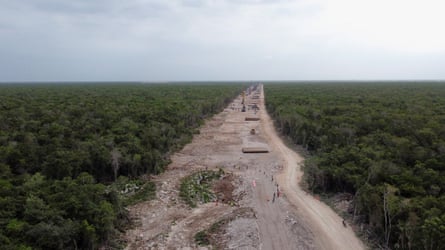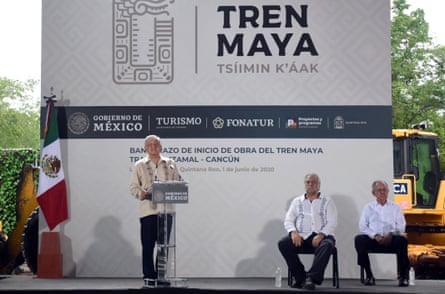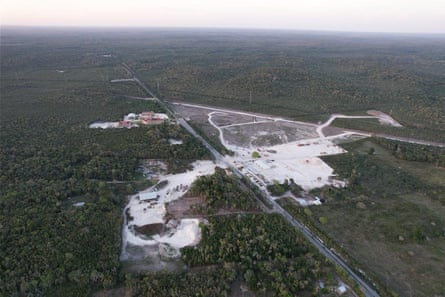Dآجرها در خارج از شهر Xpujil در ایالت Campeche در جنوب مکزیک بر روی زمین لخت گچی می چرخند. زمین در حال پاکسازی است تا راه را برای خط قطار مایا باز کند، یک پروژه بزرگ بحثبرانگیز که از شبه جزیره یوکاتان عبور میکند و گردشگران را از استراحتگاههای ساحلی کانکون و تولوم به مکانهای باستانشناسی مایا در قلب جنگل میبرد.
در حال حاضر منطقه قابل توجهی از جنگل های بارانی استوایی، دومین جنگل بزرگ در قاره آمریکا پس از آمازون، برای مسیری به طول 1525 کیلومتر (948 مایل) خارج شده است که از طریق زمین هایی که عمدتاً توسط گروه های بومی ساکن هستند، خواهد گذشت.
«آنچه با پروژه بزرگ قطار مایا انجام می شود به هیچ وجه مایا نیست. این یک تصمیم از بالا است. حدود 100 نفر از رهبران بومی، فعالان و ناظران بین المللی که به آن ملحق شده بودند، گوش دادند. کاروان جنوب مقاومت می کند (جنوب در برابر کاروان مقاومت می کند)، که از پنج ایالتی که قطار در آن تردد می کند عبور کرد و از جوامع بازدید کرد تا مخالفت با این پروژه را تشویق کند.

اعضای کاروان و همچنین دانشگاهیان، دانشمندان و حقوقدانان هشدار میدهند که این طرح آسیبهای جدی زیستمحیطی بهویژه در امتداد بخشی از مسیری که از ذخیرهگاه زیستکره Calakmul میگذرد، یک سایت میراث جهانی یونسکو، که در آن اهرام باستانی از میان جنگل فوران میکنند، خواهد داشت. سایبان بیش از 100 گونه پستاندار در این جنگل زندگی می کنند، از جمله مهم ترین جمعیت جگوار در میان آمریکا، 398 گونه پرنده و 84 خزنده که برخی در معرض خطر انقراض هستند.
تقریباً 3000 خانوار ساکن در این مسیر آواره شده اند.
قطار مایا پروژه حیوان خانگی رئیس جمهور مکزیک آندرس مانوئل لوپز اوبرادور است که می گوید اشتغال و زیرساخت ها را به یکی از فقیرترین و کم ارتباط ترین مناطق کشور می آورد. کار در اوایل سال 2020 آغاز شد و لوپز اوبرادور مصمم است تا قبل از ترک سمتش در سال 2024 کار را به پایان برساند. Fonatur (صندوق ملی برای ارتقای گردشگری)، اداره دولتی که این پروژه را مدیریت می کند، می گوید که اولین قطارهای سریع السیر قرار است وارد شوند. Cancún در ماه جولای، و در امتداد بخشی از مسیر در ماه اوت آزمایش خواهد شد. این پروژه 20 میلیارد دلاری قرار است تا پایان سال تکمیل شود.
دولت لوپز اوبرادور خط راه آهن را یک پروژه امنیت ملی اعلام کرده و ارتش را مسئول گشت زنی، حفاظت و نظارت بر بخشی از ساخت و ساز کرده است.

حداقل 25 شکایت حقوقی توسط گروه هایی که در طول مسیر تلاش می کنند برای توقف یا ممانعت از پیشرفت راه آهن ثبت شده است. در مارس 2020، شورای منطقه ای بومی و مردمی Xpujil، که گونزالس دیاز عضو آن است، حکم دادگاه را برای توقف ساخت و ساز دریافت کرد، اما مقامات به کار ادامه دادند.
روز پنجشنبه گذشته هنگامی که دادگاه عالی مکزیک حکم داد قطار و سایر کارهای توسعه را نمی توان خودسرانه موضوع «امنیت ملی» اعلام کرد، بارقه امیدی به وجود آمد. با این حال، رئیس جمهور تنها چند ساعت بعد این نام را مجدداً اعاده کرد.
after newsletter promotion
The caravan set off from Chiapas at the end of April and travelled for 10 days on foot and by bus along the entire route. Carrying banners that read “No to the killer train” and shouting “Calakmul is a treasure worth more than gold”, the protesters reached the site of the proposed station at Xpujil in early May. About 20 soldiers stood guarding a lone tree amid the desolation. González Díaz handed the guard at the sentry post a piece of paper with the judge’s decree, while soldiers took photos of the protesters. Members of the caravan know they are taking risks by opposing a government project of this size and importance. Mexico was named the most dangerous country in the world for environmental activists last year.
However, not everyone is opposed to the railway. As the protesters marched through the sunbaked streets of Xpujil, shouts of “Viva el tren Maya” – long live the Maya train, could be heard. A man leaned out of his car window to ask why the marchers don’t want an end to poverty in the area. There was a tense moment near the construction site when a car faced down the protesters, before grudgingly allowing them to pass.

According to the government, the project received an almost 90% approval rating in a 2019 referendum conducted in the affected states. Opponents said there was a low turnout and a lot of the information – specifically details of how the train will affect the environment – was poorly translated into Indigenous languages. The Mexico office of the UN high commissioner for human rights said the government’s consultation process was flawed.
While López Obrador initially promised that not “a single tree” would be felled, the government now concedes that 3.4 million have been cut down so far, although environmentalists say the actual number is nearer 9 million.
For Ezequiel Cauich Cauich, a tourist guide at Calakmul, every tree is “a habitat where there are bats, birds, insects and water”. Cauich worries that the damage to the ecosystem will further affect water supplies in the region. Last August, Mexico’s water board said water availability has reduced by almost two-thirds in the Yucatán peninsula in the past two decades.
Water already has to be rationed in the dry season, says Cauich, pointing to the tanks on the roofs of the houses in Xpujil, where two hotels and a casino are due to be built.
Renovation of an aqueduct and building two new wells and a water treatment plant have failed to ease concerns over shortages. “How are we going to compete with tourists for water?” says Cauich.

Sara López González, another member of the Regional Indigenous and Popular Council, is saddened by how the railway has divided the community.
She says Fonatur held several meetings “to tell us about all the beautiful things the Maya train would bring, but they never talked to us about the negative impacts”. “The consultation was rigged, held just to legitimise” the Maya train, which she claims is a misnomer because it takes the name of the Indigenous people whose rights it is infringing. López González, who has been jailed for her activism, adds: “They said it would bring development but it will be just the opposite. It is a megaproject of death. It is an ecocide.”
Pedro Uc Be, of the Múuch’ Xíinbal Assembly of Defenders of the Mayan Territory, says he is losing hope that the protests will succeed. “I don’t know if I have hope any more, my hope is splintered, broken and sealed within each of the cenotes [underground caverns filled with water] که دولت آن را آسفالت کرده است» تا قطار عبور کند. مایه تاسف است، اما آینده امیدوارکنندهای نمیبینیم.»
Fonatur به درخواست ها برای اظهار نظر پاسخ نداده است.